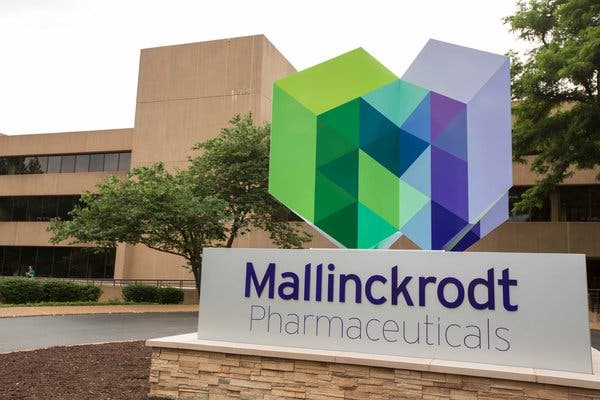One of the biggest makers of generic opioids in the United States has reached a tentative settlement of claims to avoid the first federal trial of drug makers, distributors and retail chains for their roles in the opioid epidemic.
Mallinckrodt Pharmaceuticals, a company investigators for the Drug Enforcement Administration once referred to as “the kingpin of the drug cartel,” announced Friday that it had agreed to pay $24 million to two Ohio counties. Under the agreement, the company would also donate $6 million worth of drugs, including addiction treatment medications, to the plaintiffs, Cuyahoga and Summit Counties.
The agreement came six weeks before the start of a trial that is intended to be a litmus test to help assess how much money the industry defendants in nearly 2,300 cases consolidated in federal court may eventually have to pay. The tentative agreement — which applies only to the two counties and does not resolve other legal claims against Mallinckrodt — is one result of a flurry of intensive bargaining in recent weeks among groups of defendants and plaintiffs in opioid cases nationwide.
Judge Dan Aaron Polster of the Federal District Court of Northern Ohio, who is overseeing the trial and all the federal cases, has prodded the parties to reach a global settlement that resolves all claims.
Such a settlement, one that would end all opioid-related claims, is the ultimate goal of Mallinckrodt and a number of other corporate defendants, including Purdue Pharma, which is in intense negotiations with states, cities and counties.
Mark Casey, Mallinckrodt’s general counsel, said in a statement that resolving the Ohio cases “gives us the necessary time to continue to work towards a global resolution of the opioid lawsuits.”
Endo and Allergan have already settled with the counties — Allergan for about $5 million in cash and Endo for about $10 million in cash plus about $1 million worth of medication. Remaining defendants in the initial Ohio trial include Johnson & Johnson, Teva Pharmaceuticals, Walgreens, and the three giant drug distributors — Cardinal Health, AmerisourceBergen and McKesson.
Typically, settlement agreements mean that sensitive documents about allegations and investigations are sealed, so that the public never has the opportunity to learn more about the matter. But also on Friday, the United States Court of Appeals for the Sixth Circuit, based in Cincinnati, ruled that documents in the federal opioid litigation, including those about Mallinckrodt, will remain largely unsealed.
“It means that all of this information in the federal litigation, which is so vital to our understanding about what happened, how we got here, will remain open,” said Adam Zimmerman, who teaches complex litigation at Loyola Law School, Los Angeles.
Mallinckrodt’s announcement also came at the end of a week of tough pretrial rulings against all the corporate defendants in the Ohio case by Judge Polster. Essentially, he said that lawyers for the counties had accumulated sufficient evidence to justify a jury trial over whether the companies had caused an epidemic of misuse of prescription painkillers.
Although Purdue Pharma and its owners, members of the billionaire Sackler family, have gripped the nation’s attention because their drug, OxyContin, was an early driver of the crisis, Mallinckrodt has had a much larger share of opioid sales, including of generic versions of oxycodone and hydrocodone.
Between 2006 and 2012, Mallinckrodt manufactured nearly 38 percent of the opioid pills distributed in the United States, according to an analysis of federal data by The Washington Post. Purdue, by contrast, had about 3 percent of the market during the same period.
In legal filings in July, plaintiffs’ lawyers said Mallinckrodt’s products accounted for a quarter of all the opioids dispensed in the two Ohio counties between 2006 and 2014.
In 2017, Mallinckrodt settled with the Drug Enforcement Administration for $35 million, to resolve allegations that it did not report suspicious opioid orders to federal authorities, as required by law. Mallinckrodt, which is legally registered in Ireland, has had an aggressive lobbying operation in Washington.
Lawyers for plaintiffs in the federal opioid litigation said in a statement that the proposed settlement would have to be approved by the county councils. Although a plan for the specific allocation of the funds has yet to be realized, lawyers said the settlement would help provide “both counties critically needed resources in the ongoing response to the opioid crisis as well as protection in any future insolvency proceeding by Mallinckrodt.”

There was other tough news for Mallinckrodt this week, including reports that it was exploring a restructuring of the company, perhaps filing for bankruptcy.
Mallinckrodt’s stock price swung widely this week after a report by Bloomberg on Wednesday that the company had hired advisers to explore restructuring and a possible bankruptcy filing. Its stock fell by about 40 percent between Wednesday afternoon and Thursday morning, but it rallied by Friday, closing up nearly 18 percent at $1.87 a share.
The company has lost much of its stock-market value this year amid broader investor fears over the outcome of the opioid lawsuits as well as threats to sales of its lead product, Acthar gel, used to treat multiple sclerosis and seizures in children. The company’s stock is down about 90 percent since January.
Mallinckrodt’s president and chief executive, Mark Trudeau, sought to play down reports that the company was considering restructuring. “Like any company, we hire advisers for all different types of things all the time,” he said on Thursday at the Wells Fargo Securities health care conference in Boston.
Mr. Trudeau also sought to distance his company from its opioid products, saying the drugs were a “legacy” that accounted for less than 10 percent of the company’s sales. He said Mallinckrodt was looking for ways to get out of the business of selling opioids. “Fundamentally we are just not the best owners of this business,” he said.

